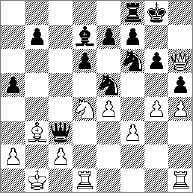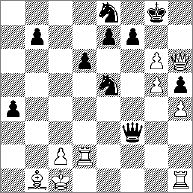Don Aldrich’s Book Reviews
Tony Miles: It’s Only Me Compiled by Geoff Lawton (Batsford, 2003) 288 pp., many diags., 4 pp. B&W plates, $27.95
“It’s only 1...b6 with a bit more space, really!?” - Miles’ explanation of 1.e4 a6 2.d4 b5, played against Karpov.
“One long suffering girlfriend and twenty four chess sets on the floor later, I determined that it was [possible].” - Miles on how he decided to give a 24-board blind simul.
“Utter crap.” - Miles review, in its entirety, of Schiller’s ‘Unorthodox Chess Openings.’
You shouldn’t be wasting your time reading this review, you should be rushing out to get this book. It is that good. And I am only a Yank. I suspect that we North Americans do not really appreciate the place Miles held in the British chess psyche. The subtitle is ‘England’s First Chess Grandmaster,’ and I believe his impact went far beyond that honor.
Well, if you insist. Miles passed away in November 2001, at the tragically early age of 46. He didn’t have time to write that ‘legacy’ book. Fortunately, he was widely published in numerous magazines and publications. This book is a loving selection from those columns. I simply am not familiar enough with the source material to know if it represents a small fraction, a majority, or some percentage in between of his total writings. And oh, what a writer he was!
We get a short one-page intro by Lawton wherein we learn that ‘It’s only me’ was one of Miles’ handles on the ICC — it is an anagram of Tony Miles. Later he refers to Nigel Short as ‘Nosher.’ We are finally let in on the joke — his anagram of Short’s name is Nosher L. Git. He also refers to Short as ‘Gump,’ presumably as in Forest Gump. Word play and cultural references are an integral part of his humor.
“Considering the amount of PR work I do for Black Horses…” - Miles commenting on his predilection for both the Alekhine and Nimzowitsch Defences.
Leonard Barden follows with a brief forward. These two sections set the tone and context for the balance of the book. The first chapter is mostly narrative prose, ‘The Chess Career of Tony Miles.’ It is a well written overview of Miles’ accomplishments for those of us not fully cognizant with the details. It is quite humorous, with most of the smiles coming from extensive quoting from Miles. The remaining chapter titles are all captioned from Miles’ writing: ‘I believe Karpov felt insulted by my choice of opening,’ ‘I get bored playing the same thing all the time,’ ‘I am nostalgic for the days before computers were invented.’ The chapters are chronologically ordered, and consist of well edited columns and writings.
“If God had intended for this knight to go to e7, what on earth did he have planned for the B(f8)?”
The writing varies wildly. Some is simply outrageous, funny and bizarre. Some is simple analysis, and there are also attempts to dig deeply into intriguing positions. There are long passages describing the ins and outs of playing professional chess for a living, and the Byzantine labyrinth of British chess politics. He tweaks the famous, and treats the ‘little guy’ with respect. There is an entire chapter devoted to his playing in the Interpolis Interzonal on a gurney due to his back problems. While the games, with notes, are given, he devotes most of the prose to describing the interactions between the players. Some were upset, some were sure that was in fact not hurting but engaging in some devious plot to upset their mental stability. This was a truly amazing chapter in chess history, and hearing it straight from the horse’s mouth is delightful. Long time readers of New in Chess may recognize this piece from the 1985 volume.
Following the ‘games’ chapters, there is a chapter of problems — tactical and endgame quizzes drawn from Miles’ play. This is followed by a chapter entitled ‘Articles.’ These consist of writings that generally have no actual chess in them, except when he is lampooning something, and are well worth the read.
“Further comments are unprintable.” - Miles after making a horrible blunder, tossing the game.
“With all the outcry over the Soviet Invasion of Afghanistan, I think it high time Jimmy Carter began to pay attention to the Soviet invasion of the USA.” - Miles commenting on the number of ex-Soviets in the 1980 World Open.
This is followed by two chapters of remembrances written by Mike Fox and Geoff Lawton. The book concludes with a chapter devoted to an overview of Miles’ openings. No analysis, but rather a short look at some of the more unusual stuff that he played. This is not a best games collection: losses, some almost painful to watch, and draws are included. It is perhaps best described as a collection of interesting chess games. One should by now understand that there is a lot of prose in this book, but there are also 118 games and game fragments, most very well annotated. Miles was something of an endgame fanatic, and he has set out quite a few of his more interesting endings, most quite deeply analyzed. The following is taken from a column entitled ‘Chinese Chess’ and features Miles essaying his favorite Dragon against Chi Ching Hsuan in 1979 (Chessbase has the game listed as Qi Jingxuan; presumably this is a result of the change in transliteration practice which took place some time in the early ‘80s).
Qi Jingxuan - Miles
Bled/Portoroz, 1979

18.a3 Up to here nothing original. It's all been played before in Somebody-Soltis (bad memory for detail) and Janosevic-Mestel, Birmingham 1975. Previously played was 18.gxh5 a4 19.hxg6 axb3 20.cxb3, etc. Mestel told me it is a forced draw. I don't quite remember why, but he knows about these things.
18...a4 19.Ba2 Ra8?! 19…Qxa3 was good for Black, but I thought that the text, threatening …Ra6-b6+ just won. Now Chi's tactical flair really becomes apparent.
20.g5! 20.gxh5 was much too slow.
20...Ne8! If 20...Ra6, 21.gxf6 Rb6+ 22.Bb3 exf6 23.Qd2 is fine for White; and on 20...Nxe4!? - 21.fxe4 Ra6 22.Bxf7+!.
21.Nf5! Bxf5 22.exf5 Ra6 23.fxg6 Rb6+ 24.Kc1!!
This was the resource I overlooked on move 19. I had observed that it left most of White's pieces en prise with check: …Qe3xa3xf3xh1, etc., but failed to appreciate that I still had no win. I thought that 24. Bb3 was forced when 24…Rxb3+!! 25.cxb3 fxg6 and the threats to the White King and Queen should win completely. Chi now had 7 or 8 minutes left to reach move 40, I had an hour or so more. I spent all but 15 minutes of it convincing myself the position was completely drawn.
24...Qe3+ 25.Rd2 Qxa3+ 26.Kd1 Qxf3+ 27.Kc1!
Now 27. ... Qa3+ 28. Kd1 Qf3+ would be a fine logical end to the sporting contest as the Russians like to say. However, I didn't feel like a fine logical end, so relying on his time trouble, I took the sort of gamble one should normally reserve for five-minute games, weekend swisses, the British Championship, that sort of thing.
27...Qa3+ 28.Kd1 Rb1+ 29.Bxb1 Qf3+ 30.Kc1 (D)

30…Nxg6??!
There was still a perpetual with …Qa3+. At this point, the hitherto inscrutable oriental became decidedly flustered. After all, isn't Black almost two rooks down? Sweat poured from his brow and he seemed to almost slip off his chair - all the more so after
31.Rdd1?? Of course not 31.Rhd1 Qa3 mate, but on 31. Re1, though Black can confuse matters with 31…Qa3+ 32.Kd1 Qb2 33.Ke2 Qc3, White must be objectively winning. 31...Qe3+ and now White is lost.
32.Rd2
32.Kb2 a3+ 33.Ka2 Qc3 and …Qb2 mate.
32...Qa3+ 33.Kd1 Qf3+ 34.Kc1 Qxh1+ 35.Rd1 Qf3 36.Ba2 e6 37.Rd3 Qf4+ 38.Kb2 Ng7 39.c3 Qxh4 40.Rf3 Qe4 41.Rf6 Qe2+ 42.Ka3 Qc2 43.c4 Ne5 44.g6 Nxc4+ 45.Bxc4 Qc3+ 46.Kxa4 Qxc4+ 0–1
This game should give you a good idea of how Miles annotates, mixing serious analysis with some of the most colourful descriptions one has ever read in a chess book. It also is a good example of the type of outrageous performance he was capable of at the board. It is impossible to do justice to this work in a short review. It is the ultimate combination of irreverence, witty repartee and serious analysis. This has been a tremendous year for chess books already — easily four or five outstrip anything published last year — and this one is one of the very best. Indeed, one would have to go back a long way in chess history to find anything as enjoyable. I will be surprised if it doesn’t take the BCF book of the year award. Strongly recommended.
Other reviews by Don Aldrich
Review 1: The Critical Moment, by GM Iossif Dorfman (PDF Format)
Review 2: Shirov's 100 Wins, by Sergei Soloviov (PDF Format)
Review 3: School of Chess Excellence 1: Endgame Analysis, by Mark Dvoretsky (PDF Format)
Review 4: Winning Chess Strategies, by Yasser Seirawan (PDF Format)
Review 5: Purdy On The Endgame, compiled by Ralph Tykodi
Review 6: School of Chess Excellence 3: Strategic Play, by GM Mark Dvoretsky
Review 7: Secrets of Positional Play, by Drazen Marovic
Review 8: Tony Miles: It's Only Me, by Geoff Lawton
Review 9: Chess Strategy In Action, by John Watson
Review 10: Leko’s 100 Wins, by Sergei Soloviov
Review 11: Super Tournaments 2002, by Sergei Soloviov
Review 12: French Nd2, by Lev Psakhis
Review 13: Chess Endgame Training, by Bernd Rossen
Review 14: King's Indian Battle Plans, by IM Andrew Martin
|


